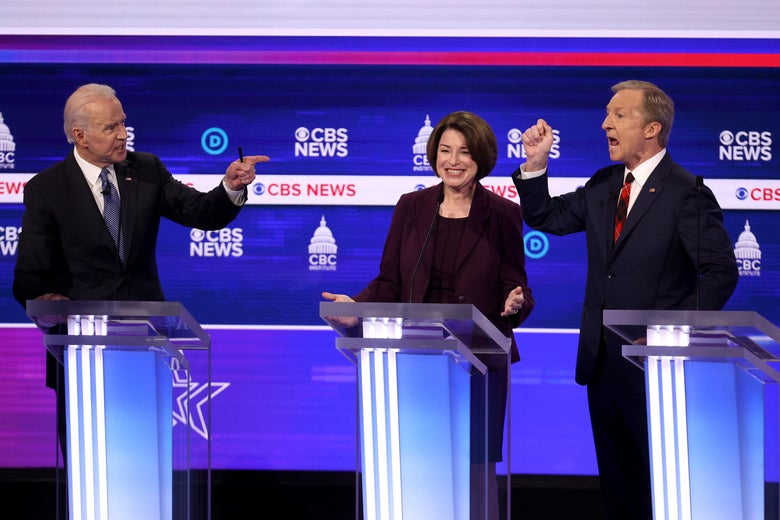
Democratic presidential candidates Joe Biden and Tom Steyer spar during the Democratic presidential primary debate on Tuesday in Charleston, South Carolina.
Win McNamee/Getty Images
During one particularly heated exchange during Tuesday’s presidential primary debate, former vice president Joe Biden, who leads in the polls in South Carolina, turned his attention to Tom Steyer, the billionaire businessman who had managed to stay out of any conflicts despite running third in the polls in the state.
Biden told an accusatory anecdote that may have shocked—and confused—viewers unfamiliar with its context:
You talk about concerns about race. My good friend on the end of this platform, he, in fact, bought a system that was a private prison system after he knew that, in fact, what happened was they hogtied young men in prison here in this state. They, in fact, made sure that in Georgia they did not have healthcare for the people who were being held. They, in fact, went on, and he said, after he knew that, he bought it. And then he said he was proud of his accomplishment.
What exactly was Biden talking about? A real controversy involving Steyer’s hedge fund’s investment in the country’s largest private prison corporation in the early 2000s.
Steyer’s hedge fund, Farallon Capital Management, had invested millions of dollars in the Corrections Corporation of America. According to Politico, this investment drew some notice at the time. Members of Yale’s graduate teachers’ union called on the university to divest from Farallon over the prison corporation’s alleged abuses. In 2004, Steyer defended the hedge fund’s work, but two years later, Farallon sold its CCA stock, and Steyer later cited the “concerns of student leaders” when explaining the decision.
But Biden was talking about very specific kinds of abuse during the debate—allegations the company’s prisons “hogtied young men” in South Carolina and in Georgia “made sure…they did not have healthcare for the people who were being held.”
These allegations come from a lawsuit and a report mentioned in a 2000 Mother Jones article. The lawsuit, about a juvenile detention facility in South Carolina, mentioned children who were “hog-tied and beaten by an overworked, undertrained staff.” In one case from 2000, a federal jury awarded a teenage inmate $3.1 million after CCA officers hogtied him and threw him against a wall, bolstering this depiction of affairs.
A 1999 state audit found that in two Georgia prisons, “the company’s neglect of medical care and security amounted to ‘borderline deliberate indifference.’”
After Biden made his comments, Steyer responded angrily by saying that Biden was misrepresenting the situation. “I bought stock in a prison company thinking they’d do a better job, and I investigated, and I sold it,” he said.
Biden replied, “You knew when you bought it they’d done that.”
It’s impossible to know whether Steyer was aware of the prison company’s mistreatment of prisoners, but that information was public at the time. However, Biden’s assertion that Steyer had said he was proud of buying a prison was false. Steyer hadn’t bought it (his hedge fund invested in the company), and he only said he was proud of his hedge fund’s work, not the prison itself.
Steyer made one more false claim to end the exchange: “Since then, I’ve worked to end the use of private prisons in my home state, and we’ve ended it.” He has claimed this before. Steyer has supported legislation in California to eventually eliminate private prisons and privately run immigration detention facilities that contract with the federal government. But there are still private prisons in the state, and there are limitations to the law that will allow a number of them to continue to operate in California.
Readers like you make our work possible. Help us continue to provide the reporting, commentary and criticism you won’t find anywhere else.
Join Slate Plusfrom Slate Magazine https://ift.tt/32puKjU
via IFTTT
沒有留言:
張貼留言